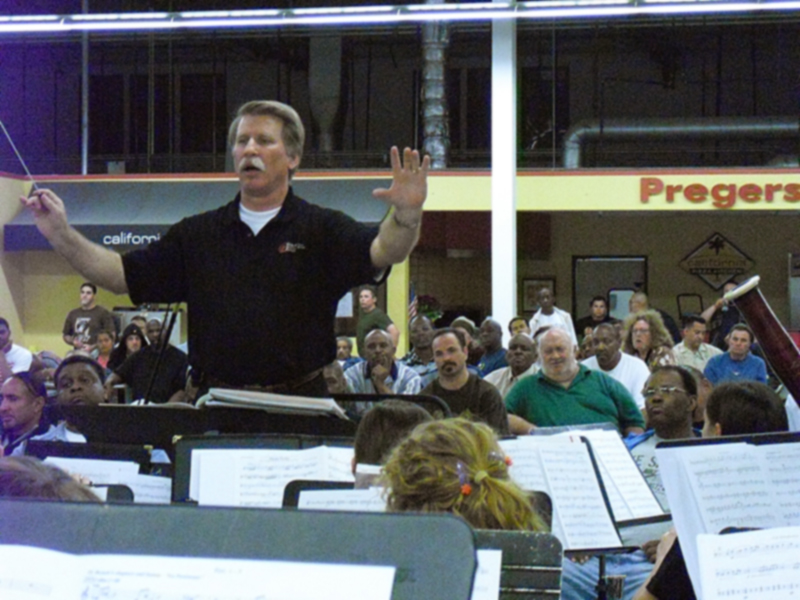The band room in Crowell Hall buzzes with activity and conversation. Nearly 50 members of the Symphonic Winds are working together to pack up the large U-Haul truck with instruments for their concert at the Salvation Army Homeless Shelter and Rehabilitation Center in Bell, Calif. The musicians are putting on the same concert they played last Friday night in Crowell Hall called, “Picture This…”
At Salvation Army, the musicians unload their gear and start preparing for the concert. Conductor Robert Feller addresses the ensemble:
“Twenty-seven minutes, everyone! Twenty-seven minutes!”
The students pick up the pace. Trombones, drums and harps are rolling in.
The shelter consists of converted warehouses that were once war supply centers.
“We never close,” says Joseph Moore, Bell shelter chaplain.
Twenty years ago, Moore was living in a cardboard box on Skid Row. But after he sobered up and graduated from the program, he eventually came to run the Bell Shelter where tonight’s concert will be.
“I’ve been sober for more than 20 years,” Moore says, smiling. He has a higher, raspy voice. “And when they say, ‘How’d you do it?’ I sit ‘em down and say, ‘Let me tell you ‘bout a man named Jesus.’”
It’s now 21 minutes until the show.
He shows me the living quarters, the school, the drug rehab rooms, the church and the library. A man is in there and I ask where he’s from. Kansas City. When I ask how he ended up here, he’s silent for a moment, but then a smile starts to break and he says loudly, “Drugs!” He laughs and has the warmest smile. “Not gonna lie to you, son!” His name is Eric. I shake his hand and wish him well.
Fifteen minutes.
I go back to the concert room and the musicians are warming up.
People of all different ethnic groups are trickling in and taking their seats. Each face has a story — a story of loss, maybe, or of addiction, confusion, aimlessness. But compared to middle class America with its cubicles, computers and coffee breaks, this community of sundry people are noticeably happier. They are smiling and joking with each other, excited for the chance to hear music.
Nine minutes.
I take my seat amongst the crowd of people who are filling up the seats. There must be around 150 people in here, their different life paths bringing them to this shelter, this room, at this time.
Four minutes.
Among those sitting is an old man with a dark gray beard down to his chest and a ragged red beanie.
One minute until showtime.
It’s a medley — a community — of people like I’ve never seen. More genuine, loving and accepting than some churches I’ve been to.
Showtime.
Moore walks to the front and says, “Now, let’s all stand up!” He motions his hands. We stand. “And welcome the Biola Symphonic Winds!” One hundred and fifty pairs of hands — 150 drug addicts, alcoholics, and homeless — give a generous applause and a loud cheer.
Feller introduces the show, and before we know it, the music fills this dingy cafeteria hung with fluorescent lights. Soon, I forget that I’m in a warehouse. While the beautiful music reverberates throughout the building, I am transported into a different place. I look around at my brothers and sisters.
An eccentric black man with a blue long-sleeved shirt nods his head at everything he approves of. He’s quite on beat, too. He’s smiling, relating to the music and fully enjoying it. The audience grows silent, appreciating the beauty of music, and after the second piece’s resounding last note, there is a roar of applause and exclamations: “Oh my…” and “A-mazin’!”
The audience is released for a 20 minute intermission –– or smoke break. The band has dispersed, not backstage, but out into the audience. They are meeting the people they’re playing for –– hearing their stories, smiling, laughing, joking.
The people reassemble. It smells of cigarette smoke. This is ministry: going out to the least and the lost. But hardly anyone makes the effort to come spend time with these people because if you’re like me, it feels like the less noble thing to do. The less important thing. Matthew 25:40 tells us otherwise.
Senior Andrea Ludwig takes the conductor’s position for the next piece, “Kitty Hawk.” She conducts gracefully and with passion. After the final note, Feller comes to the front with a smile and asks the crowd, “Did she do O.K.?” Shouts of affirmation follow.
Feller masterfully conducts the next few songs. As he explains about Degas’ ballerinas, the man in the long-sleeved shirt nods again. And when the music starts, his eyes close and his head bobs along with the music. A man with a handlebar moustache and stringy hair down to the middle of his back leans forward on his seat and looks on with eager eyes.
After the final song of the night, Feller turns around and bows, the band stands up, and the crowd rises from their seats and claps loudly. There is joy in this warehouse, joy in the hearts of the shelter residents, joy in the hearts of the band. The applause continues. I scan the room. This is true ministry, and what music is all about.







